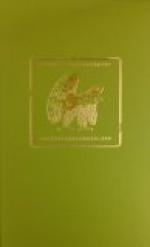but I managed to find the place and picked up the
trail we had worn packing over the ice. And I
lost it; probably in a new thaw that had opened and
glazed over since I left. Anyhow, in a little
while I didn’t know where I was. I had given
my compass to Weatherbee, and there was no sun to
take bearings from, not a landmark in sight. Nothing
but fog and ice, and it all looked alike. The
surface was too hard to take my impressions, so I
wasn’t able to follow my own tracks back to the
landing. But I had to keep moving, it was so miserably
cold; I hardly let myself rest at night; and that
fog hung on five days. The third evening I found
myself on the water-front, and pretty soon I stumbled
on my canoe. I was down to a mighty small allowance
of crackers and cheese then, but I parcelled it out
in rations for three days and started once more along
the shore for Yakutat. The next night I was traveling
by a sort of sedge when I heard ptarmigan. It
sounded good to me, and I brought my canoe up and
stepped out. I couldn’t see, but I could
hear those birds stirring and cheeping all around.
I lay down and lifted my gun ready to take the first
that came between me and the sky.” His voice
had fallen to an undernote, and his glance rested
an absent moment on the circle of light on the rafter
above an electric lamp. “When it did, and
I blazed, the whole flock rose. I winged two.
I had to grope for them in the reeds, but I found
them, and I made a little fire and cooked one of them
in a tin pail I carried in the canoe. But when
I had finished that supper and pushed off—
do you know?”—his look returned, moving
humorously from face to face—“I was
hungrier than I had been before. And I just paddled
back and cooked the other one.”
There was a stir along the table; a sighing breath.
Then some one laughed, and Banks piped his strained
note. “And,” he said after a moment,
“of course you kept on to that missionary camp
and waited for the fog to lift.”
Tisdale shook his head. “After that supper,
there wasn’t any need; I turned back to the
glacier. And before I reached the landing, I heard
Weatherbee’s voice booming out on the thick silence
like a siren at sea; piloting me straight to that
one dip in the ice-wall.”
He looked off again to the end of the room, absently,
with the far-sighted gaze of one accustomed to travel
great solitudes. It was as though he heard again
that singing voice. Then suddenly his expression
changed. His eyes had rested on a Kodiak bearskin
that hung against a pillar at the top of the gallery
steps. The corner was unlighted, in heavy shadow,
but a hand reaching from behind had drawn the rug
slightly aside, and its whiteness on the brown fur,
the flash of a jewelled ring, caught his attention.
The next moment the hand was withdrawn. He gave
it no more thought then, but a time came afterward
when he remembered it.
“Weatherbee had noticed that fog-bank,”
he went on, “from high up the glacier.
It worried him so he finally turned back to meet me,
and he had waited so long he was down to his last
biscuit. I was mighty reckless about that second
ptarmigan, but the water the birds were cooked in made
a fine soup. And the fog broke, and we overtook
the Tlinket and supplies the next morning.”




